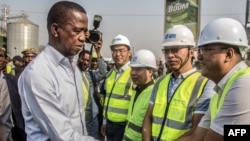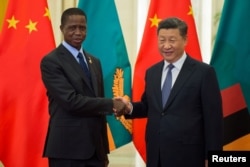In early September, James Lukuku staged a one-person protest in Zambia’s capital, Lusaka, against his country’s relationship with China.
Lukuku brandished a homemade sign that read: "China EQUALS Hitler." Scrawled on his T-shirt was a plea to U.S. President Donald Trump for help.
“I want every Zambian to rise and stop the influence of China,” said Lukuku, who heads the opposition Republican Progressive Party. The ruling party, he added, was “selling this nation to the Chinese.”
Though it was a one-man protest, Lukuku is not the only person ringing alarm bells about Zambia’s relationship with China. Several opposition and civil society groups have warned that Zambia’s debt payments are unsustainable, and that China could take over businesses and public assets.
Yet despite strong rhetoric, it’s unclear exactly how indebted Zambia has become, or whether China has seized ownership of any Zambian interests.
And even as its relationship with China comes under increasing scrutiny, it is Zambia’s ties with other players that appear to be fraying.
Withholding assistance
The International Monetary Fund, a major creditor throughout Africa, has decided to withhold $1.3 billion in financing to Zambia, while it waits for assurances the country has a solid plan to deal with its debt.
“There are currently no discussions on a possible fund-supported program given the authorities’ borrowing plans compromise the country’s debt sustainability and undermine its macroeconomic stability,” Dhaneshwar Ghura, the IMF’s chief of mission in Zambia, told VOA by phone.
“When a country gets into a situation of debt distress, the role of the IMF is to help resolve the problem,” Ghura said.
That includes facilitating dialogue with creditors, he added.
But Zambia’s officials must be willing to talk openly, and others have expressed concern with the country’s lack of transparency and apparent corruption.
Last week, the BBC reported that the U.K. had decided to suspend aid assistance to Zambia after the Zambian government said $4.3 million in British aid money had gone missing.
Growing loans, faltering economy
Other African countries have much deeper ties to China and have prompted similar concerns over opaque deals. But Zambia’s borrowing has coincided with a sharp decline in its economy, driven in large measure by falling prices for copper, the country’s main export.
From 2000 to 2016, Lusaka accumulated about $6.37 billion in Chinese loans, according to data compiled by the China-Africa Research Institute (CARI) at Johns Hopkins University. Most loans have gone to transport, power and government projects, CARI found, and Zambia accumulated almost all of its debt since 2010.
A nation with a thriving economy might be able to handle the debt. But after years of growth that led to a record-high GDP of $28 billion in 2013, Zambia’s economy contracted to $19.55 billion just three years later.
Amos Chanda, spokesperson for President Edgar Lungu, told VOA this month that Zambia has economic problems but is far from a debt crisis.
He also denied reports that Chinese companies were taking over public assets.
“There is no single Chinese company taking over,” he said.
Zambia secured a $30 million interest-free loan and a $30 million grant at the recent Forum for China-Africa Cooperation in Beijing, Chanda added.
‘Elements of risk’
Economic woes and frustration with a government that appears to be struggling to manage its debts may have soured public perceptions of China’s role in Zambia.
But China itself has contributed to a problematic lack of transparency, Scott Morris, a senior fellow at the Center for Global Development and the director of the U.S. Development Policy Initiative, told VOA.
“There are still elements of risk that really go back to the failure of China to sign up to and be governed by a set of rules around sustainable financing,” Morris said.
“What do you do when a country is in debt stress? What rules do you follow?”





